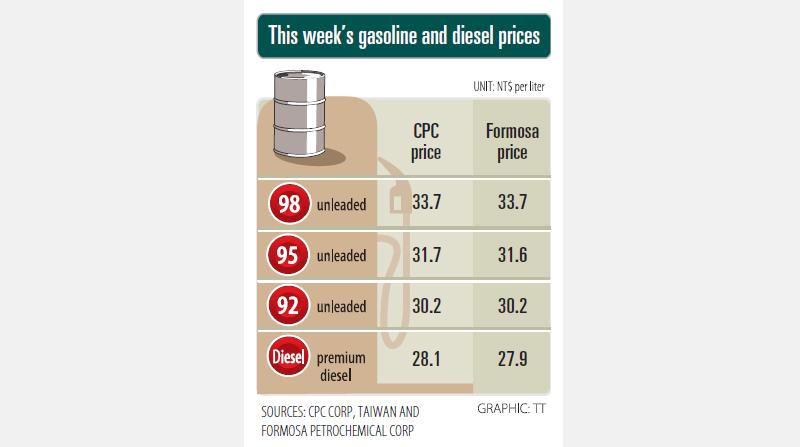CPC Corp, Taiwan (CPC, 台灣中油) and Formosa Petrochemical Corp (台塑石化) yesterday said that they would increase gasoline and diesel prices, effective today, as global crude oil prices continued to move higher amid market concerns about geopolitical and supply issues.
CPC said that it would raise gasoline prices by NT$0.3 per liter to NT$30.2, NT$31.7 and NT$33.7 for 92, 95 and 98-octane unleaded gasoline respectively, while the price of premium diesel would increase by NT$0.6 per liter to NT$28.1.
Based on its floating oil price formula, the cost of crude oil last week increased by 1.61 percent from a week earlier, the state-run refiner said, attributing the increase to reports that Russia has continued to mass troops on Ukraine’s border.

Other factors, including OPEC+ continuing to keep a lid on production, are also pushing oil prices higher, CPC said.
Formosa said that a lack of de-escalation on the Ukrainian border as well as drawn-out nuclear talks between Washington and Tehran were factors affecting market sentiment, leading the price of crude oil to fluctuate in volatile trading last week.
The company said that it would increase its prices for 92, 95 and 98-octane unleaded gasoline by NT$0.3 per liter to NT$30.2, NT$31.6 and NT$33.7 respectively, while the price of premium diesel would increase by NT$0.6 to NT$27.9 per liter.

To many, Tatu City on the outskirts of Nairobi looks like a success. The first city entirely built by a private company to be operational in east Africa, with about 25,000 people living and working there, it accounts for about two-thirds of all foreign investment in Kenya. Its low-tax status has attracted more than 100 businesses including Heineken, coffee brand Dormans, and the biggest call-center and cold-chain transport firms in the region. However, to some local politicians, Tatu City has looked more like a target for extortion. A parade of governors have demanded land worth millions of dollars in exchange

Hong Kong authorities ramped up sales of the local dollar as the greenback’s slide threatened the foreign-exchange peg. The Hong Kong Monetary Authority (HKMA) sold a record HK$60.5 billion (US$7.8 billion) of the city’s currency, according to an alert sent on its Bloomberg page yesterday in Asia, after it tested the upper end of its trading band. That added to the HK$56.1 billion of sales versus the greenback since Friday. The rapid intervention signals efforts from the city’s authorities to limit the local currency’s moves within its HK$7.75 to HK$7.85 per US dollar trading band. Heavy sales of the local dollar by

Taiwan Semiconductor Manufacturing Co’s (TSMC, 台積電) revenue jumped 48 percent last month, underscoring how electronics firms scrambled to acquire essential components before global tariffs took effect. The main chipmaker for Apple Inc and Nvidia Corp reported monthly sales of NT$349.6 billion (US$11.6 billion). That compares with the average analysts’ estimate for a 38 percent rise in second-quarter revenue. US President Donald Trump’s trade war is prompting economists to retool GDP forecasts worldwide, casting doubt over the outlook for everything from iPhone demand to computing and datacenter construction. However, TSMC — a barometer for global tech spending given its central role in the

An Indonesian animated movie is smashing regional box office records and could be set for wider success as it prepares to open beyond the Southeast Asian archipelago’s silver screens. Jumbo — a film based on the adventures of main character, Don, a large orphaned Indonesian boy facing bullying at school — last month became the highest-grossing Southeast Asian animated film, raking in more than US$8 million. Released at the end of March to coincide with the Eid holidays after the Islamic fasting month of Ramadan, the movie has hit 8 million ticket sales, the third-highest in Indonesian cinema history, Film